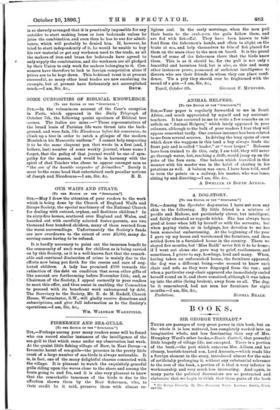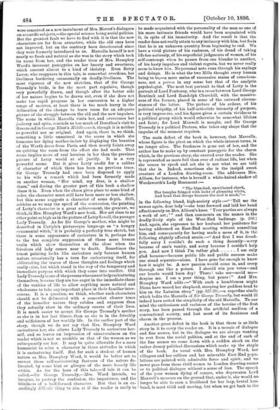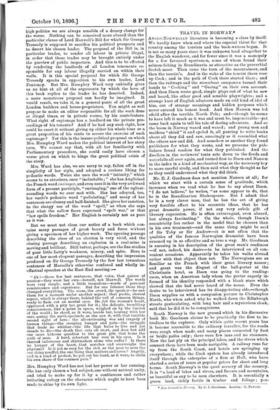BOOKS.
SIR GEORGE TRESSADY.*
THERE are passages of very great power in this book, but on the whole it is less matured, less completely worked into an imaginative whole, and less fascinating than any of Mrs. Humphry Ward's other books,—Bessie Costrell, that powerful little tragedy of village life, not excepted. There is a portion of the book,—the part which concerns Mrs. Allison and her clumsy, boorish-hearted son, Lord Ancoats,—which reads like a foreign element in the story, introduced almost for the sake of artificially prolonging it, without any substantial relevance to the rest of the book, a portion of it that is very inferior in workmanship and very much less interesting. And again, in many parts the political discussions are so protracted and elaborate that we begin to think that these parts of the book • Sir George Tressady. By Mrs. Humphry Ward. London : Smith, Eller. and Co.
were conceived as a new instalment of Mrs. Marcet's dialogues on scientific subjects,—the special science being social politics.
But the greatest fault we have to find with it is that the new characters are far from attractive, while the old ones have not improved, but on the contrary have deteriorated since they were formerly introduced to us. Marcella herself is not nearly so fresh and natural as she was in the story which took its name from her, and the reader tires of Mrs. Humphry Ward's incessant panegyrics on her beauty and sweetness, which amount almost to a kind of idolatry. Even Betty Leven, who reappears in this tale, is somewhat overdone, her liveliness bordering occasionally on deadly-liveliness. The most vigorous of the new sketches, that of Sir George Tressady's bride, is for the most part repulsive, though very powerfully drawn, and though after the better side of her nature begins to be drawn out, even if she does not make too rapid progress in her conversion to a higher range of motives, at least there is too much hurry in the delineation of the change to leave room for an adequate picture of the struggle between the old and the new impulses.
The scene in which Marcella visits her, and overcomes her jealousy and spite, reminds us too much of Dorothea's visit to
Rosamond in George Eliot's Middlemarch, though it is neither
so powerful nor so original. And again, there is, we think, something a little unnatural in the scene in which she humours her dying mother-in-law by displaying the beauties of the Worth dress from Paris, and then nearly faints away on quitting the room from the effort she had made. That scene implies more of real heroism in her than the previous picture of Letty would at all justify. It is a very powerful scene. But it gives Letty credit for a calibre of character of which there has been no previous trace. Sir George Tressady had once been disposed to apply to his wife a remark which had been formerly made on another woman, " Her mind, my dear, is a shallow chaos," and during the greater part of this book a shallow
chaos it is. Even when the chaos gives place to some kind of order, the character must still have been more or less shallow, but this scene suggests a character of some depth. Still, criticise as we may the speed of the conversion, the painting of Letty's character is a great achievement, the greatest, we think, in Mrs. Humphry Ward's new book. Her art rises to no other point so high as in the picture of Letty Sewell, the younger Lady Tressady. As for Sir George's mother, who might be described in Carlyle's picturesque language as "a hungry ornamental witch," it is probably a perfectly true sketch, but there is some appearance of caricature in it, perhaps due to the too complete suppression of those more human traits which show themselves at the close when the frivolous old lady comes near to death. Sometimes the truest painting looks like caricature only because human nature occasionally has a turn for caricaturing itself, for obliterating the traces of those thoughts and feelings which really exist, but which stand in the way of the temporary and immediate purpose with which they come into conflict. Old Lady Tressady is one of the persons who cannot help caricaturing themselves, because they are too eager in the immediate chase of the vanities of life to allow anything more natural and wholesome to take any important place in their familiar inter- course. It is a question, we think, whether such characters should not be delineated with a somewhat clearer trace of the homelier nature they subdue and suppress than they actually show in the ordinary course of their lives. It is much easier to accept Sir George Tressady's mother as she is in her last illness, than as she is in the frivolity and selfishness of her worldly life. In the earlier part of the story, though we do not say that Mrs. Humphry Ward caricatures her, she allows Lady Tressady to caricature her- self, and so leaves an impression of unnaturalness on the reader which is not so credible as that of the woman as we subsequently see her. It may be quite allowable for a mere humourist to seize a character in those attitudes in which it is caricaturing itself. But for such a student of human nature as Mrs. Humphry Ward, it would be better art to correct these self-caricaturing features of the nature de- lineated, by some hint or glimpse of the more homely life within. As for the hero of this tale,—if tale it can be called,—Sir George Tressady,—Mrs. Ward intends, we imagine, to portray the confusion, the impatience, and the blindness of a half-formed character. But that is an ex- ceedingly difficult thing to aim at if the reader is really to be made acquainted with the personality of the man as one of his more intimate friends would have been acquainted with it, in spite of his immaturity. And the result is that the reader does not really attain to any intimacy with him, but feels that he is an unknown quantity from beginning to end. We have a vivid picture of his rashness, of his dread of taking life too seriously, of his superficial judgments of women, of hie self-contempt when he passes from one blunder to another, ► of his hasty impulses and violent regrets, but we never really seem to know him. No personal note runs through his sayings and doings. He is what the two Mills thought every human being to be,—a mere series of successive states of conscious- ness, not a person in any sense but that of the analytic psychologist. The next best portrait to that of Letty is the portrait of Lord Fontenoy, who is a cross between Lord George Bentinck and Lord Randolph Churchill, with the massive- ness of the former, placed in some of the outward circum- stances of the latter. The picture of his ardour, of his political ubiquity, of his half-articulate intensity of purpose, is very impressive, and his figure gives a certain vividness to a political group which would otherwise be somewhat lifeless and faint; for Lord Maxwell is nought, and Sir George Tressady is a political Proteus, who takes any shape that the impulse of the moment requires.
The main defect of the book is, however, that Marcella, whose figure is the pivot on which the whole interest turns, is no longer alive. The freshness is gone out of her, and the author has to make up by constant panegyric for the charm which, in the previous story, she exerted over the reader. She is represented as more full than ever of radiant life, but when she comes to speak and act she is not what we are told- that she is. Indeed, sometimes she is the insipid sweet creature of a London drawing-room. She addresses Mrs. Allison, for instance, who is herself a white-haired shadow of Wordsworth's Lady Beaumont
The blanched, nnwithered cheek, Her temples fringed with locks of gleaming white, And head that droops because the soul is meek,"— in the following bland, high-society style :—" ' Tell me the names again, dear lady '—she bent forward and laid her hand- affectionately on Mrs. Allison's knee. Your parties are always a work of art ; " and then comments on the names in the deadly-lively style of the West-End badinage. (p. 208.)• And, again, she expresses to her husband her penitence for having addressed an East-End meeting without consulting him, and consequently for having made a mess of it, in the- following slightly affected strain :—" And first I was dread- fully sorry I couldn't do such a thing decently—sorry because of one's vanity, and sorry because I couldn't help you. And now I think I'm rather glad I am only glad because—because public life and public success make one stand separate—alone. I have gone far enough to know how it might be. A new passion would come in, and creep through one like a poison. I should win you votes—and our hearts would burn dry ! There ! take me—scold me-- despise me. I am a poor thing, but yours ! " And Mrs. Humphry Ward adds :—" With such a humbleness might Diana have wooed her shepherd, stooping her goddess head to. him on the Latmian steep" (pp. 327-28),—a superfine simile- which befits the Marcella of Sir George Tressady, but would ill indeed have suited the simplicity of the old Marcella. To our mind the enthusiasm and rashness of the heroine cf the first story, has been passed through the artificial medium of a conventional society, and lost most of its freshness and charm in the process.
Another great defect in the book is that there is so little- story in it to carry the reader on. It is a mosaic of dialogue and fine scenes, but in the dialogue we are always wanting to rest from the social politico, and at the end of each of the fine scenes we come down with a sudden shock on the rather dreary political discussions which make up the staple of the book. As usual with Mrs. Humphry Ward, her villagers and her colliers and her miserable East-End popu- lations are painted with admirable force and spirit, and we never pass from these vivid scenes to London drawing-rooms or to political dialogue without a sense of loss. The speech of the poor woman dying of cancer, who deprecates Lord Maxwell's measure on the ground that, under it, she would no- longer be able to earn a livelihood for her lazy, brutal hus- band, is most vivid and moving, but when we get back to the high politics we are always sensible of a dreary change for the worse. Nothing can be conceived more absurd than the particular clause of Lord Maxwell's Bill for which Sir George Tressady is supposed to sacrifice his political prospects and to desert his chosen leader. The proposal of the Bill is, in particular trades, to render all labour in private illegal, in order that these trades may be brought entirely under the purview of public inspectors. And this is to be effected by rendering the landlords of all London tenements re- sponsible for any labour illegally carried on within their walls. It is this special proposal for which Sir George Tressady speaks in opposition to his own leader, Lord Fontenoy. But Mrs. Humphry Ward very unkindly gives us no hint at all of the arguments by which the hero of this book replies to the leader he has deserted. Indeed, a more monstrous proposal can hardly be imagined. It would result, we take it, in a general panic of all the great London builders and house-proprietors. You might as well propose to make an editor responsible for all the work done at illegal times, or in private rooms, by his contributors.
What right of espionage has a landlord on the private pro- ceedings of his tenants P And if he had any such right, how could he exert it without giving up either his whole time or a great proportion of his rents to secure the exercise of such espionage ? Yet this is the insane political proposal on which Mrs. Hnmphry Ward makes the political interest of her story turn. We cannot say that, with all her familiarity with Parliamentary procedure, she could easily have chosen a worse pivot on which to hinge the great political crisis of the story.
Mrs. Ward has also, we are sorry to say, fallen off in the simplicity of her style, and adopted a curious liking for
pedantic words. Twice she uses the word " intimity," which seems to us atrocious, once "ineluctable; " she has Anglicised the French word envisager, and even uses it in the very awkward
form of a present participle, " envisaging," one of the ugliest- sounding words we ever met with. She has adopted, too, her uncle's pedantic word " pullulating," and many of her sentences are clumsy and half-finished. She gives her sanction, to the slangy use of the word "spell," as when she says that what the sallow faces expressed "spelt war," or that "law spells freedom." Her English is certainly not as pure as it was.
But we must not close our notice of a book which con- tains many passages of great beauty and force without giving a specimen of her higher work. The opening passage describing the close of an election is very vivid, and the closing passage describing an explosion in a coal-mine is moving and brilliant. Still better, perhaps, are the fine studies of poor little Letty's weakness, misery, and spite. Here is one of her most eloquent passages, describing the impression produced on Sir George Tressady by the few last tremulous sentences of Marcella's otherwise confused and wholly in- effectual speeches at the East End meeting :—
" Ah !—those few last sentences, that voice, that quiver of passion—they were her own—herself, not Maxwell. The words were very simple, and a little tremulous—words of personal reminiscence and experience. But for one listener there they changed everything. The room, the crowd, the speaker—he saw them for a moment under another aspect : that poetic, eternal aspect, which is always there, behind the veil of common things, ready to flash out on mortal eyes. He felt the woman's heart, oppressed with a pity too great for it ; the delicate, trembling consciousness, like a point in space, weighed on by the burden of the world ; he stood, as it were, beside her, hearing with her ears, seeing the earth-spectacle as she saw it, with that terrible second sight of hers : the all-environing woe and tragedy of human things—the creeping hunger and pain—the struggle that leads no whither—the life that hates to live and yet dreads to die—the death that cuts all short, and does but add one more hideous question to the great pile that hems the path of man. A bard, reluctant tear rose in his eyes. Is it starved tailorosses and shirtmakers alone who suffer ? Is there no hunger of the heart, that matches and overweighs the physical? Is it not as easy for the rich as the poor to miss the one thing needful, the one thing that matters and saves ? Angrily, and in a kind of protest, he put out his hand, as it were, to claim his own share of the common pain."
Mrs. Humphry Ward has not lost her power or her cunning. She has only chosen a bad subject, one without natural unity, and tried to make up for it by a continuous and rather irritating eulogy on the character which ought to have been made to shine by its own light.




















































 Previous page
Previous page